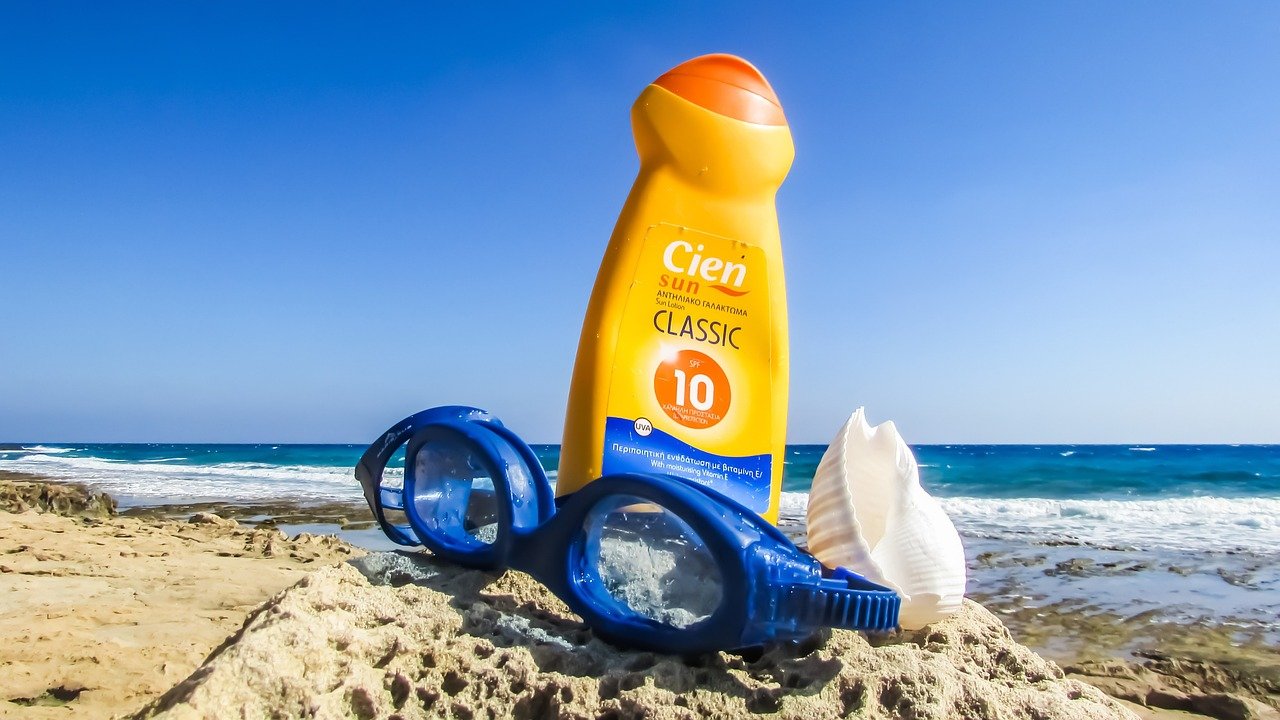Sunscreen and Vitamin D deficiency? Today I am going to tell you the most common myths about sunscreens. I am Dr. Acharna Dermatologist. Today I am going to bust 10 myths about sunscreens.

I am sure you will find this helpful. The first myth is that sunscreens darken your skin. Not at all.
Sunscreens do not darken your skin at all. If you are using sunscreens that have zinc oxide, and if your skin is on the darker side, then you may feel that your skin is looking dark or bluish. For example, if you are using a wrong foundation shade, then how do you feel that your skin is looking dull or grey? In the same way, if you are using a zinc oxide based sunscreen, then you may feel that your skin is looking dull.
This happens when you are using a clean zinc oxide sunscreen or a sunscreen that leaves a white cast. Whenever you rub this white cast, you will feel that your skin is looking blue or dull. If you are using chemical sunscreens or gel-based sunscreens, which spread very well and do not leave any white cast, then your skin will not look darker.
The second myth is that chemical sunscreens are harmful and you should always use natural sunscreens. Not at all. Nothing happens by using natural sunscreens.
There are usually two types of filters in sunscreens. One is chemical filters and the other is physical filters, which are called organic filters and inorganic filters. Inorganic or physical filters include zinc oxide, titanium dioxide, iron oxide.
Chemical or organic filters include homosalate, octisalate, oxybenzone, avobenzone, octinoxate, tinosorb, uvinol, and miroxyl. These are all chemical filters. Usually, there are two types of filters in sunscreens.
There is no natural filter like carrot seed oil. You will not get UV protection from all these. So please don’t fall for this marketing gimmick.
Nothing happens by using only natural sunscreens. They are good for the skin. Chemical filters can also effectively protect the skin from UV rays.
So this is wrong. There is nothing like natural sunscreens are better. You should use sunscreens that have SPF 50, which have proper UV filters, and which have PA 3+.
The third myth is that it is enough to apply sunscreen once. Not at all. You will have to repeat the sunscreen on a regular basis to get proper protection.
Especially if you travel a lot, then it is very important to use sunscreen every 3-4 hours. Otherwise, the chances of your skin getting burnt and tanned increase. If you travel a lot, then you can use stick sunscreen.
It is very easy to apply. Reapplication is also easy with stick sunscreen. If you are in a corporate job, where there is no sunlight, then you can use sunscreen once or twice.
But if you work in an office space, where there is a lot of natural light, and big windows, then it is very important to use sunscreen every 3-4 hours. Because glass only blocks UVB, not UVA. UVA rays do not block dark spots.
That is why it is important to use sunscreen. The fourth myth is that if you are sitting at home, or on cloudy days, then you do not need sunscreen. Not at all.
Even if you are sitting at home, you have to apply sunscreen once. Even if you sit in front of the balcony, the sun is enough to darken your skin. That is why it is important to apply sunscreen at that time.
Even in cloudy days, it is important to apply sunscreen. Because clouds do not completely block UV rays. UVA penetrates.
That is why it is important to protect your skin. So apply sunscreen even on cloudy days. The fifth myth is that physical sunscreen reflects UV rays, and chemical sunscreen absorbs them.
Not at all. Physical sunscreen also absorbs UV rays and converts them into heat. The mechanism of physical and chemical sunscreen is very similar.
Physical sunscreen also reflects UV rays, but to a large extent, it also absorbs them and converts them into heat. So those who have sensitive skin type, prefer physical sunscreen. And those who are pregnant or lactating, prefer physical sunscreen.
Because it reduces the potential of irritation. But physical sunscreen also absorbs UV rays and converts them into heat. The sixth myth is that Oxybenzone is harmful for the skin.
There was a study in animals. In which it was shown that if Oxybenzone is used in a very high amount, it can disrupt our hormones. But the concentration available in our sunscreens is at a safe level and you can use it.
When should you avoid Oxybenzone? If you have photo contact dermatitis, or stubborn melasma, or your skin is very sensitive, you can avoid Oxybenzone and use a zinc oxide sunscreen. Otherwise, the affordable sunscreens in the market contain Oxybenzone. So you don’t have to worry, you can use it without fear.
And because it is such a readily available and effective UV filter, you can definitely use it. But if you have all the problems that I told you earlier, then you should avoid Oxybenzone and use a UV filter sunscreen. The seventh myth is that if your skin is tanning, then your sunscreen is not working.
The work of sunscreen is not only to protect it from tanning, it also protects your skin from sunburn, early signs of aging, and dark spots. So if you are in the sun a lot, like in the beach area or swimming, then your tanning will happen. Because the sunscreen you use will not give you enough protection to completely block the tanning.
So even if you are tanning, your sunscreen is protecting your skin from sunburn. So if you are tanning, it doesn’t mean that you leave the sunscreen completely and it won’t be effective. So if you have a lot of exposure in the sun, then definitely tanning can be done, but it will save you from burn and long-term damage to your skin.
So do apply sunscreen. The eighth myth is that sunscreens cause cancer. Some animal studies were done, in which a high concentration of sunscreen was used.
So it was shown that there is some activity in it, which causes sunscreens in the skin, due to which it became a little suspicious that sunscreen causes cancer. But after this, a lot of studies have been done, and all these UV filters are FDA cleared. So you don’t have to be afraid of cancer at all.
Sunscreens actually save from skin cancer, but skin cancer in general, the Indian skin type, our South Asian skin type, there is less incidence of skin cancer, compared to Caucasian skin type. So that’s why our skin has less skin cancer anyway, but sunscreen reduces the skin aging process in our skin, reduces aging changes, reduces dark spots from getting darker. So do use sunscreen, it won’t cause cancer.
The ninth myth is that sunscreen is not necessary for children. Sunscreen is necessary for everyone, it is also necessary for children. Especially if the child is swimming, or is engaged in outdoor activities, or is on vacation, then you must apply sunscreen.
You can use plain zinc oxide sunscreen in children, and it is also very important to reapply them. It can cause burns in children’s skin, it can cause flaking, UV rays can damage the skin, it can be seen in children too. So it is very important to apply sunscreen in children too.
When we go on vacation, we see that the children get very red, and their blisters also appear, especially in the shoulder area. So apply sunscreen not only on the face, but also on the shoulders, arms, legs, so that there are no sunburns. The tenth myth is that sunscreen causes vitamin D deficiency.
In South Asian genetics, vitamin D deficiency is seen to be very high, but this is not due to the use of sunscreen. Studies have been done where they have seen that those who apply sunscreen regularly, and those who do not apply sunscreen, their vitamin D levels have been compared, and no difference has been found in that. And the amount of sunscreen you apply, it does not block 100%, as much as it penetrates, it is enough to synthesize vitamin D. But yes, vitamin D deficiency is very common in our population, so that’s why you can get your blood tested and take oral supplements if you have vitamin D deficiency.
And if you see such food sources, which are very rich in vitamin D, then if you increase the consumption of that food, then you will not have vitamin D deficiency. But if you have vitamin D deficiency, should you stop sunscreen? Not at all. And you will not have vitamin D deficiency by using sunscreen.
So you can use sunscreen on a regular basis without worrying about getting vitamin D deficiency. So these were some myths that I am asked a lot, in the comment section and also in the OPD. I hope you liked the video and learned something from it.
Sunscreen is a very important part of skin care, especially if you are struggling with dark spots, then definitely apply sunscreen. It will also improve your skin health. So if you apply sunscreen on a regular basis, then your skin will be much better.
I hope you liked the video and learned something from it. If you like such skin and hair related videos, then you can follow me on Instagram handle DrAnacha lMD. There I post skin and hair related blog daily.
